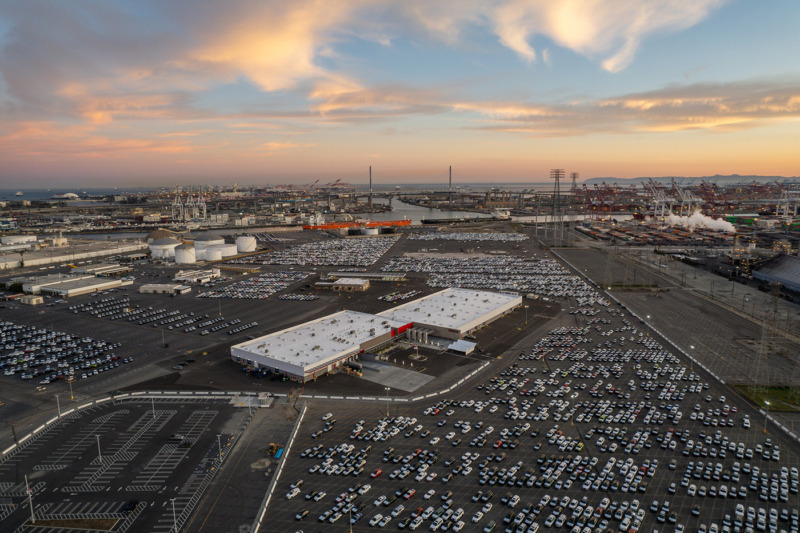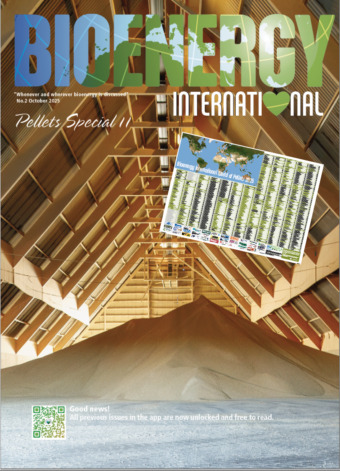Canada-headed biogas technology provider Anaergia Inc. has announced that its US subsidiary SoCal Biomethane, LLC, (SoCal Biomethane) will supply renewable natural gas (RNG) as facilitated by renewable fuels marketer Anew Climate LLC (Anew) to FuelCell Energy Inc’s Tri-gen system to produce carbon-negative hydrogen and electricity for Toyota Motor North America, Inc.’s (TMNA) Logistics Services Center at the Port of Long Beach in California (CA).
The facility is Toyota’s largest port operation handling import/exports for North America and processes about 200 000 vehicles per year.
FuelCell Energy’s Tri-gen system will produce approximately 1.3 tonnes of renewable hydrogen per day which will fuel Toyota Mirai vehicles.
The fuel cells will also produce a net 2.3 MW of electricity—enough to power the TMNA Logistics Services Center—and will add renewable electricity to the grid, as well as produce roughly 1 400 (US) gallons of water (≈ 5 299 litres) a day that will be used for car-washing operations.
Renewable natural gas is a great way to produce renewable hydrogen and electricity at the scale required to support our Logistics facility’s carbon-neutral goal. And because it is made from waste, renewable natural gas creates the type of circular economy that Toyota is working to expand, said Mark Yamauchi, Sustainability Manager for Toyota Motor North America.
Benefits of carbon-negative biomethane
Anaergia’s supply of renewable natural gas (RNG), aka biomethane which is the same molecule as methane, will be produced from food waste and municipal wastewater at the Company’s SoCal Biomethane plant in Victorville, CA.
It will be sold and delivered to FuelCell Energy through Anew, the exclusive RNG marketer for the Victorville facility.
We are pleased to celebrate another milestone in our long-standing collaboration with Anaergia and to engage with FuelCell Energy and Toyota in realizing the zero-emissions benefits of RNG. Through climate leadership, as exemplified by this agreement we are creating markets for the environmental impact that benefit our broader community and the climate, said Randy Lack, Head of Portfolio Management for Anew Climate.
Because the methane sourced from Anaergia is made from renewable sources that otherwise emit fugitive methane emissions from decomposition, it is considered carbon negative.

Thus, when this carbon-negative RNG is then converted to hydrogen and electricity in FuelCell Energy’s Tri-gen system, both outputs are considered zero-emissions and carbon negative.
Converting this RNG to renewable electricity is expected to avoid more than 9 000 tonnes of grid electricity greenhouse gas (GHG) emissions per year.
Renewable hydrogen is expected to avoid more than 4 000 tonnes of annual GHG emissions compared to the emissions produced if the hydrogen had been made by conventional steam reforming of fossil natural gas.
A P3 project
FuelCell Energy’s Tri-gen system will also reduce the air pollution that disproportionately impacts nearby communities, as the fuel cell’s chemical reaction is virtually free of NOx, SOx, and particulate matter (PM) emissions.
We are excited to partner with Anaergia to supply our Tri-gen system with renewable natural gas as it is an effective way to create renewable hydrogen at distributed scale local to the end user, avoiding the cost and emissions associated with the delivery of hydrogen to remote users. This allows us to help customers, like Toyota, achieve their sustainability goals by producing emissions-free hydrogen, electricity, and water, said Tony Leo, Chief Technology Officer, FuelCell Energy.
Anaergia’s SoCal Biomethane facility was developed through a public-private partnership (P3) with the Victor Valley Wastewater Reclamation Authority (VVWRA) and financing partner North Sky Capital.
We are proud to support Toyota’s decarbonization goals at one of the largest ports in the world with the supply of carbon-negative renewable natural gas that enables emissions-free hydrogen fuel. Carbon-negative fuels like renewable natural gas are essential to creating a net-zero emissions world. Because it’s a drop-in fuel, renewable natural gas enables rapid decarbonization. It’s an immediately dispatchable platform for electricity and hydrogen production, said Yaniv Scherson, Chief Operating Officer of Anaergia.



